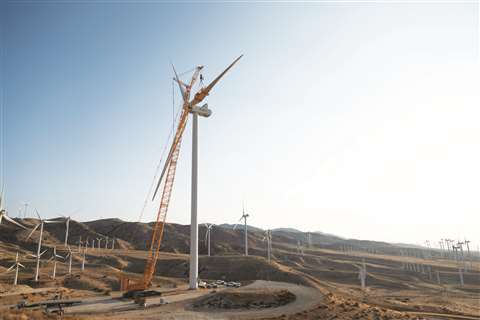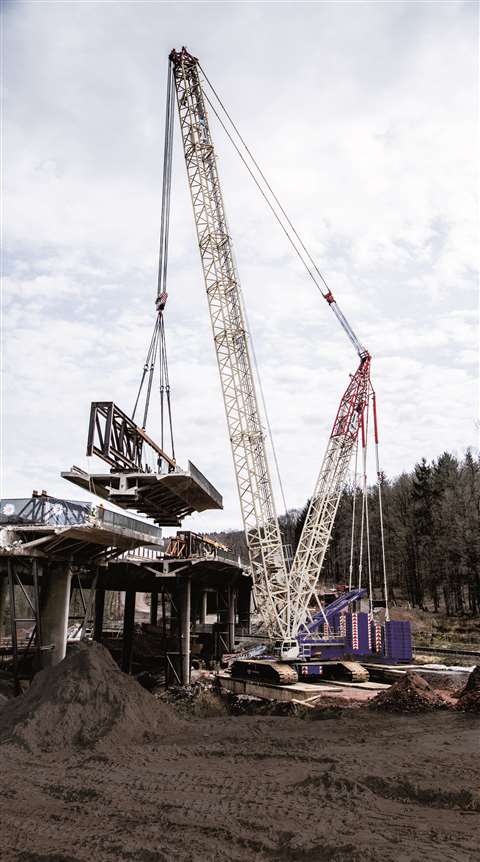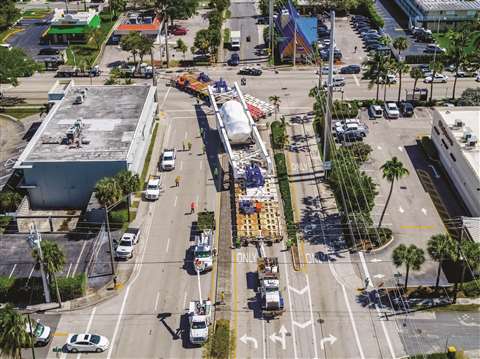SC&RA tackles ongoing environmental issues with latest Forum
13 July 2022
The Association’s Environmental Forum offers members a strategic glimpse at what’s ahead for business.
Set for September 13th in Centreville, Virginia, the upcoming SC&RA Environmental Forum evolved out of the burgeoning SC&RA Environmental Committee. Within this group, Association members are beginning to look ahead and prepare for how changes in regulatory systems will evolve and impact industry as the government tackles ongoing environmental issues.
 Wind energy will be a big part of the North American power grid. A Liebherr LR 1800 hoists nacelles and wind turbine blades in the mountains of Southern California. Photo: Bigge Crane & Rigging
Wind energy will be a big part of the North American power grid. A Liebherr LR 1800 hoists nacelles and wind turbine blades in the mountains of Southern California. Photo: Bigge Crane & Rigging
Allen Schaeffer, an expert on clean diesel technologies with the Diesel Technology Forum, will serve as the keynote at the one-day event. He also spoke at the first Committee meeting last year.
Schaeffer has been working with SC&RA for more than a year, providing insights and perspective on current environmental issues, as well as organizing the Forum.
“From an outsider’s perspective, I’ve been happy to share my experience with the Association,” he said. “We’ve definitely seen a growing level of interest from members on environmental topics.”
People are paying more attention to the news, especially climate-related policy within the new administration, explained Schaeffer. “There’s a lot of money and policy behind it. I think that’s grabbed everyone’s attention, and perhaps compelled a higher level of thinking about this than in years past.”
Evolving environmental issues
Additionally, he pointed to the customer side. “Folks in the transportation sector, for example, are realizing they have to continue to keep their customers happy with service and products, but those customers are evolving in terms of their understanding of, and concern for, various types of environmental issues.
“You’re seeing companies being asked about both their regular services as well as their environmental policies – i.e., what kind of steps are you taking to reduce your carbon emissions within your fleet? So, the customers are asking more questions about environmental performance, and that’s been a wakeup call on the business side. These are the types of questions we’re probably going to see more of in the future, so we really should be prepared to answer them.”
Schaeffer also indicated that construction and transport companies are beginning to see environmental issues as less of a compliance burden and more of a business opportunity. “There’s a lot of companies out there that are now advertising their environmental, social and corporate governance (ESG) principles – what they stand on, and how they do business,” he pointed out. “And customers are looking for those types of things more and more, to differentiate their vendors and business partners. Leaders are beginning to realize that they can turn this into an asset. In addition to, say, being the ‘safest or most affordable,’ companies can describe the emissions they cut last year, or how they’re recycling wash water from their trucks, and so on.”
 Data will be at the heart of the crane, rigging and specialized transport industry’s successful adaptation to environmental issues.
Data will be at the heart of the crane, rigging and specialized transport industry’s successful adaptation to environmental issues.
Common ground between crane, rigging and transportation
Given the opportunity the Forum is going to present to SC&RA members, Schaeffer is excited to be a part of something that he believes will help companies do their jobs better, maybe save some money and even help boost business.
“I think it’s important to be offering your members forward-thinking programs that help them not only solve some of the challenges they’re having today, but anticipate and steer clear of the problems they might have in the future,” he noted. “And you always have more success when you get this type of activity moving through a group. They learn from each other. So, the fact that SC&RA is getting members together in this way is going to generate some truly beneficial discussions on what’s happening now in this space, and where we see these issues going in this industry in the next three to five years.”
As for common ground between both crane and rigging as well as transportation members, Schaeffer sees it as an operational issue. “The use of something other than diesel fuel often comes up – say, the use of renewable diesel fuel as a way to continue to leverage the assets that you have,” he said. “Diesel engines in trucks and machines and offroad equipment can be used in a way that emits far lower emissions – and not just greenhouse gas emissions, but also things like particulate matter, the smog-forming side of it as well.
“So I think it’s about, what can you do with what you have – and how do you quantify that, inspect that and manage that? Additionally, is alternative fuel a smarter option for you, or electric? And what’s the calculous on that? So, we’re seeing more companies exploring this approach.”
Ultimately, Schaeffer sees the upcoming Forum as a way for SC&RA members to immerse themselves in the knowledge that’s out there and increase their awareness of all the information that’s possible now and in the future. “At the end of the day, if you don’t ask the questions first, your customers will be the ones asking them,” he emphasized. “You want to be ahead of the curve – and have the answers. You’ll retain that business and likely grow it – as opposed to saying, well we haven’t really thought about that. Let me get back to you in a couple weeks.”
Why should members attend the Forum?
Schaeffer believes firmly that data will be at the heart of industry’s successful adaptation to environmental issues. “Essentially, what do you know about what you have and what you do,” he indicated. “If, within one of your projects, you’re using fifteen vehicles, involving trucks and onsite cranes, etc., what’s the condition of those assets? Are they old, new? What type of technology do they have? What do we know about their emissions?
 In a turn-key power plant solution, Edwards delivered four turbines and generators, the largest weighing 1,887,985 pounds.
In a turn-key power plant solution, Edwards delivered four turbines and generators, the largest weighing 1,887,985 pounds.
“Then you dig into things like emission profiles, which better allows you to model and predict. So, it’s not just what kind of lifting capacity you’ll need, but what will be the total emissions profile for this project? And to the client, you can provide that information, and by the way, ‘… here’s how we’re going to reduce that by ten percent by cutting idle time,’ which is of course wasted fuel and emissions.”
The starting line
In that way, he added, data gives companies an exclusive insight into what’s really going on within a jobsite. “Again, asking the right questions and proper data gathering really gets to the core of what you’re doing, and how it impacts the environment – that’s the starting line here. You also often find that there’s low-hanging fruit there – and those small successes are important. In a Class A truck, you know if it idles for an hour, you’re using maybe three-quarters of a gallon of fuel. So today, at nearly six dollars a gallon, you can do the math on that pretty quick. If you cut down idling by nearly thirty percent, that saves X thousand dollars this month – and so on.”
As for why members should attend the Forum, Schaeffer believes it’s time for leaders to roll up their sleeves and pursue the information needed to compete. “It’s not just for the sake of the business – as a professional, it also boosts your standing and expands your capabilities beyond what perhaps you’re doing now,” he explained. “It makes you more valuable. And a lot of it is right in front of us. Ultimately, it might differentiate the successful companies from ones that maybe weren’t paying attention as much as they should have been.”
It’s all about the interactions and the resulting perspective gained. “Firsthand discussions with people – hearing about their day-to-day problems,” he said. “What are they saying when discussing these issues? What does environment mean to them? How do they talk about it now? Do they even talk about it? Conversations like these on every level can be very insightful, and in this case, likely quite impactful.”
STAY CONNECTED


Receive the information you need when you need it through our world-leading magazines, newsletters and daily briefings.




